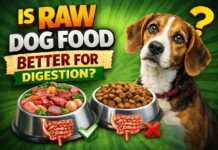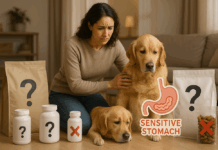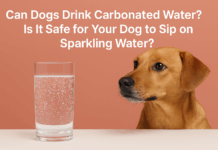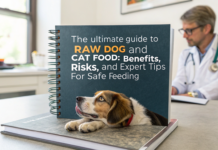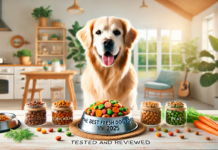Last Updated on March 17, 2023 by Dogs Vets
What to Do if Your Dog Eats Something They Shouldn’t
Everyone is familiar with the old saying: “curiosity killed the cat”. What most people don’t realise is that dogs are exactly the same way.
Most dogs are curious and love to explore their environment, sometimes doing so in ways that can be harmful to them. If you own a dog, you already know that they will often pick up and eat anything they find on the floor.
Most dog owners will have a couple of experiences where their dog has scarfed down something they shouldn’t eat but having a pattern for your puppy or dog can lessen the chances for your pet.
If your dog has just eaten something inedible or toxic, it can be a scary and stressful situation so knowing what to feed your pet and what not is vital.
You might feel helpless and unsure of what to do next. Let’s take a look at exactly what you should do if your dog eats something they shouldn’t, so that you can react quickly to keep them safe.
What to Do if Your Dog Eats Something They Shouldn’t
Step 1: Stay Calm
The first step is to remain calm and not panic. Dogs often swallow items whole, so chances are it will pass through their system without causing any harm.
Take deep breaths and concentrate on getting the information you need to help your dog.
Step 2: Assess the Situation
The next step is to assess the situation. What did your dog eat, and how much? Has your pet already eaten the substance or is it still in their mouth? Knowing this information will help you decide on the best course of action for your pet.
If your dog has eaten something toxic or dangerous, such as chocolate, antifreeze, cleaning products, medications or other hazardous substances, it’s important to take action right away.
Step 3: Call the Vet
Once you have assessed the situation, contact your vet immediately. If possible, take a picture of what your dog ate so that you can show it to them.
Your vet will be able to advise you on what steps to take next in order to ensure that your pet is safe and healthy.
In some cases, they may advise you to make your dog vomit up the toxins right away; in others cases they may suggest waiting until they have further information before taking any action.
Hydrogen peroxide can be used to induce vomiting in dogs if done within two hours of ingestion and advised by a veterinarian.
However, this is not suitable for all types of substances that may have been consumed and should only be done under professional guidance. Never attempt to induce vomiting without consulting a vet first!
Step 4: Assess Your Dog’s Symptoms
Observe your pup for any signs of distress. Common symptoms include vomiting, diarrhoea, excessive drooling, lethargy and loss of appetite.
Even if there is no visible distress or if symptoms are mild, keep an eye on your dog and don’t leave them unsupervised.
Step 5: Bring Your Dog in For Examination
If your dog has ingested something non-toxic but still potentially dangerous (such as string, rubber bands or small pieces of plastic) then your vet may recommend taking an x-ray in order to determine if anything is stuck in their digestive system.
Depending on the size and type of object ingested, surgery may be necessary in order to remove it safely from the body. Items that are particularly dangerous can include:
- Chicken or cooked pork bones
- Dog toys
- Items of clothing such as socks or scarves
In addition to consulting with a vet when dealing with a potential ingestion crisis, it’s helpful to know what signs and symptoms are associated with this type of emergency.
Some dogs may experience vomiting or diarrhoea shortly after eating something they shouldn’t; others may appear lethargic or show signs of pain or discomfort when touched around the abdomen area.
It’s also important to remember that prevention is always better than a cure. Some preventative steps you can take are:
- Make sure that all hazardous items are kept out of reach from curious dogs
- Dispose of food scraps responsibly (in sealed bins)
- Regularly check toys for small parts that could pose a choking hazard
- Never leave medication lying around where dogs could get into them easily
Keeping dangerous items away from your dog can help prevent accidental ingestions from occurring in the first place – which is always the best outcome.
FAQ’s
Q: What are some common items that dogs eat that they shouldn’t?
A: Dogs can eat a variety of items that can be harmful, such as chocolate, grapes, raisins, onions, garlic, xylitol, medications, and household cleaners.
Q: What are some signs that my dog has eaten something they shouldn’t have?
A: Signs can vary depending on what your dog ate, but some common symptoms include vomiting, diarrhea, lethargy, loss of appetite, abdominal pain, and trouble breathing.
Q: What should I do if I suspect my dog has eaten something they shouldn’t have?
A: Contact your veterinarian immediately. They may recommend inducing vomiting, administering activated charcoal, or other treatments.
Q: Is it safe to induce vomiting in my dog if they have eaten something toxic?
A: It depends on what your dog ate and how long ago. Vomiting may not be recommended if your dog has ingested a caustic substance or if they are showing signs of distress.
Q: Can I give my dog over-the-counter medications to help with their symptoms?
A: No, do not give your dog any medications without consulting with your veterinarian first. Some human medications can be toxic to dogs.
Q: Can I use home remedies to treat my dog if they have eaten something they shouldn’t have?
A: No, do not try to treat your dog with home remedies as they may do more harm than good. Always seek the advice of a veterinarian.
Q: How can I prevent my dog from eating something they shouldn’t have?
A: Keep harmful items out of reach, supervise your dog when they are outside, and train them to “leave it” when they try to pick up something they shouldn’t.
Q: Can dogs develop long-term health problems from eating something toxic?
A: Yes, some toxic substances can cause long-term damage to organs such as the liver and kidneys.
Q: Should I bring the item my dog ate to the veterinarian?
A: Yes, if possible, bring the item or its packaging to the veterinarian to help identify the toxin and determine the best treatment.
Q: What can I do to prepare for a potential emergency involving my dog?
A: Keep your veterinarian’s phone number and the number for a 24-hour emergency veterinary clinic handy, and have a pet first aid kit and a basic understanding of pet first aid.
Facts Check:
We hope you enjoyed this article… What are your thoughts on How To Keep Your Dog Calm And Entertained During A Family Road Trip?
Рleаse let us knоw yоur thоughts in the соmments seсtiоn. Feel free to share with us in the comments section below.

